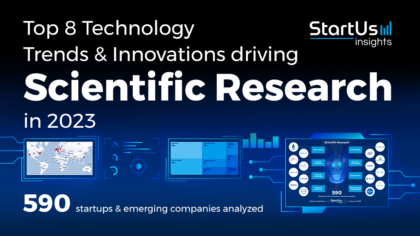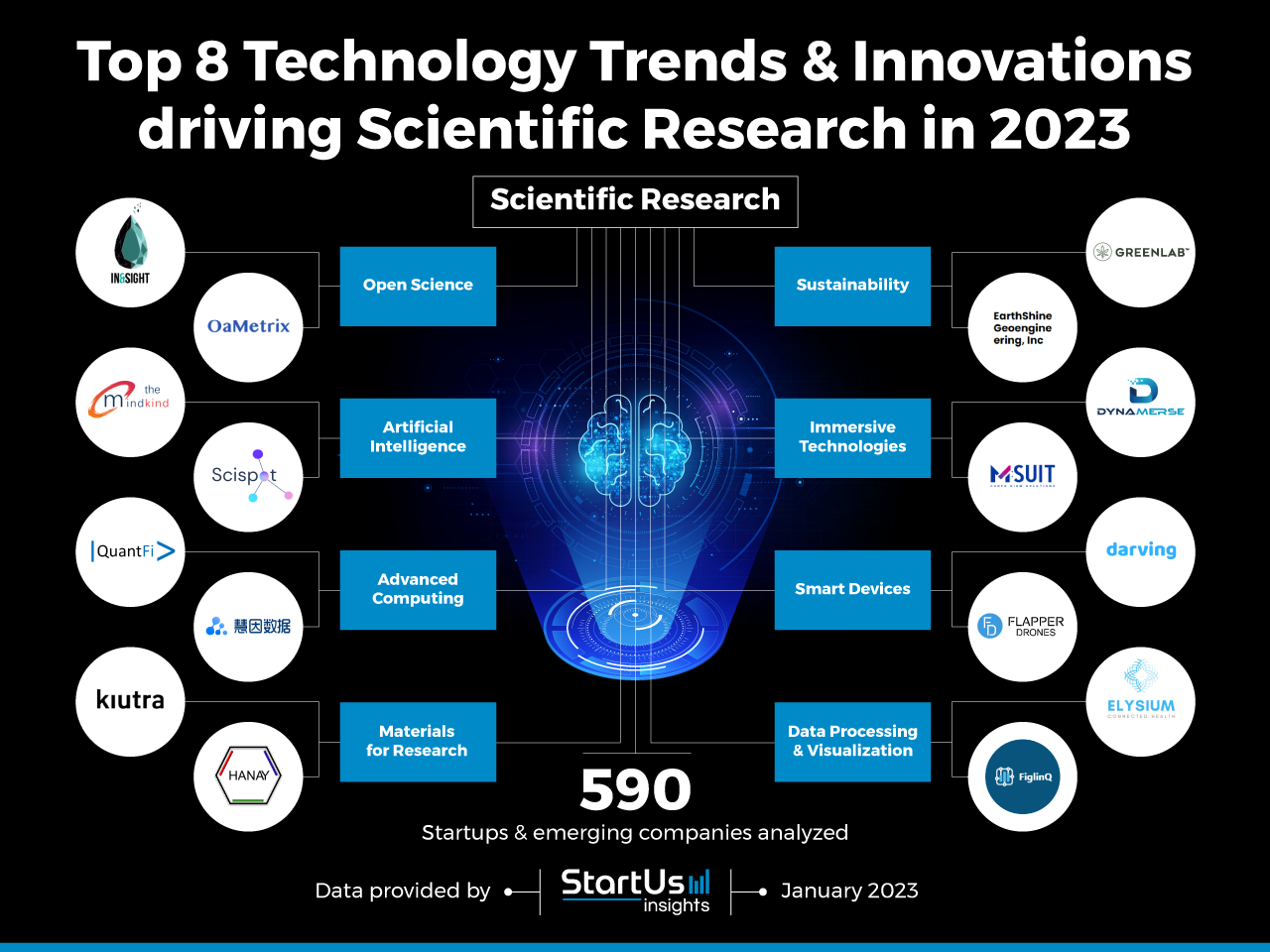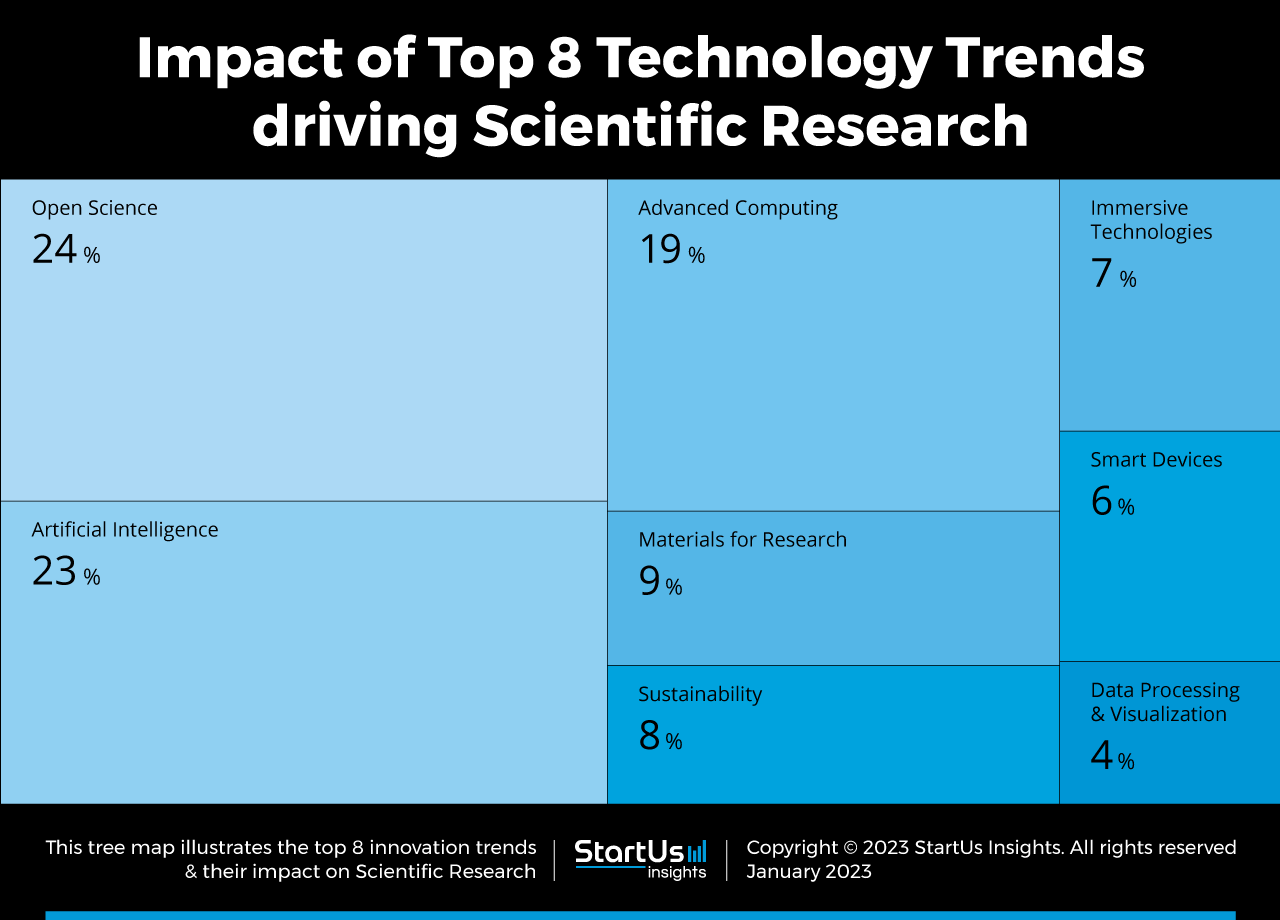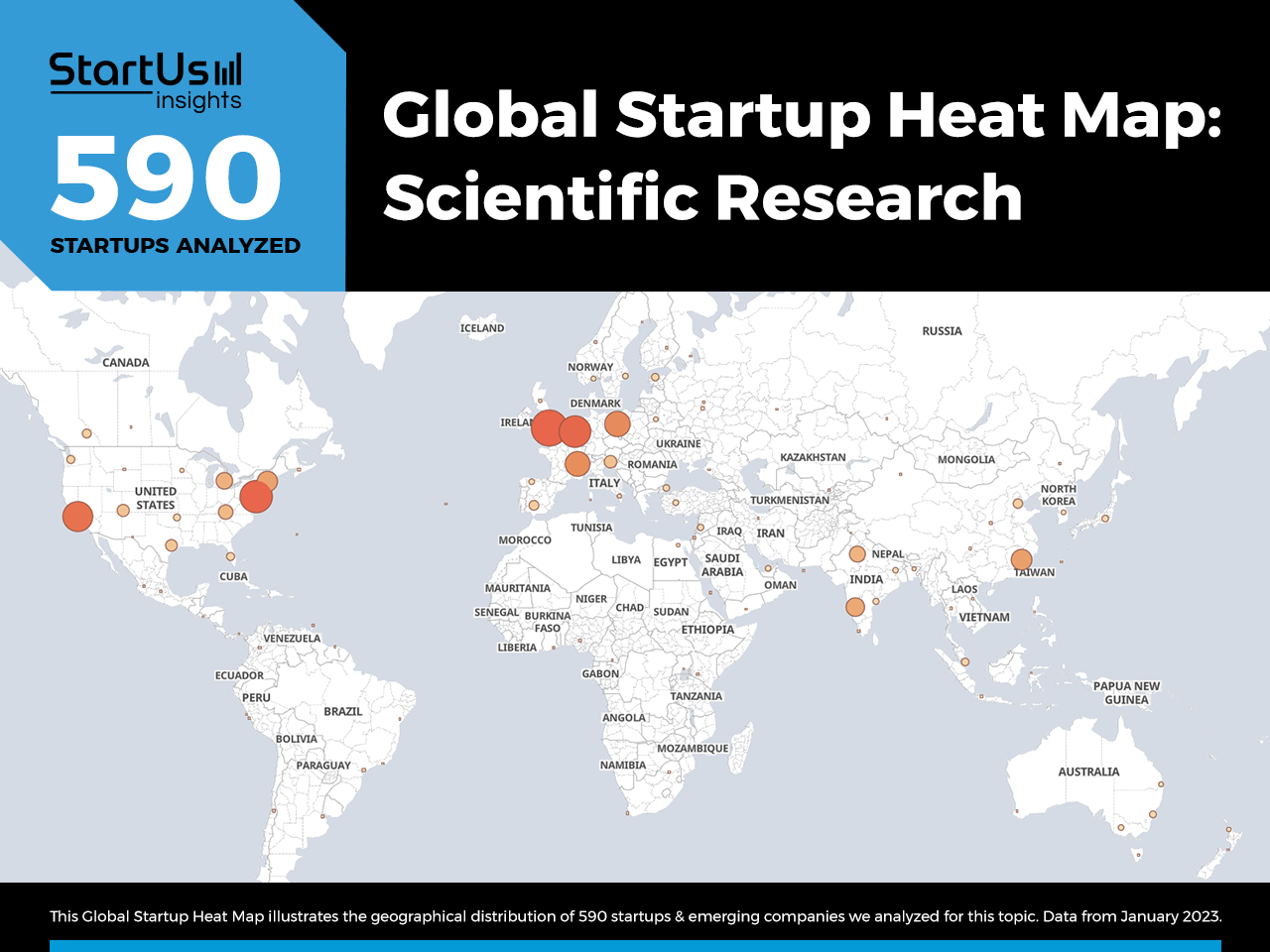Accelerate Productivity in 2025
Reignite Growth Despite the Global Slowdown
Advances in science and technology and their adoption in the real world are channelized by scientific research and interpretation. Research methods and workplaces are also evolving with the raising need for novel tools and technologies. Startups and emerging scaleups from academia are working to develop these research requirements. This report provides an overview of scientific research technology trends ranging from open science and artificial intelligence (AI) to immersive technologies and advanced computing. They accelerate the research timeline and novel therapeutics discovery, as well as create sustainable, environment-friendly development. Read more to explore how they impact your business.
Innovation Map outlines the Top 8 Scientific Research Technology Trends & 16 Promising Startups
For this in-depth research on the Top Scientific Research Trends & Startups, we analyzed a sample of 590 global startups and scaleups. The result of this research is data-driven innovation intelligence that improves strategic decision-making by giving you an overview of emerging technologies & startups in the scientific research industry. These insights are derived by working with our Big Data & Artificial Intelligence-powered StartUs Insights Discovery Platform, covering 2 500 000+ startups & scaleups globally. As the world’s largest resource for data on emerging companies, the SaaS platform enables you to identify relevant startups, emerging technologies & future industry trends quickly & exhaustively.
In the Innovation Map below, you get an overview of the Top 8 Scientific Research Technology Trends & Innovations that impact 590 companies worldwide. Moreover, the Scientific Research Innovation Map reveals 16 hand-picked startups, all working on emerging technologies that advance their field.
Top 8 Scientific Research Trends
- Open Science
- Artificial Intelligence
- Advanced Computing
- Materials for Research
- Sustainability
- Immersive Technologies
- Smart Devices
- Data Processing & Visualization
Tree Map reveals the Impact of the Top 8 Scientific Research Trends
Based on the Scientific Research Innovation Map, the Tree Map below illustrates the impact of the Top 8 Scientific Research Trends in 2023. Open science and related research practices, including open source, open access, and open drafting, are the most impactful scientific research technology trends. AI plays a critical role in the research lifecycle of the hypothesis till interpretation. Further, advanced computing allows scientists to compile, collate, and analyze massive volumes of raw data. Other trends in scientific research include advanced materials for research, improving sustainability in research, and immersive technologies. Lastly, smart tools and devices, along with data processing and visualization, aid research investigations and hypothesis validation.
Global Startup Heat Map covers 590 Scientific Research Startups & Scaleups
The Global Startup Heat Map below highlights the global distribution of the 590 exemplary startups & scaleups that we analyzed for this research. Created through the StartUs Insights Discovery Platform, the Heat Map reveals that UK and US see the most startup activity.
Below, you get to meet 16 out of these 590 promising startups & scaleups as well as the solutions they develop. These 16 startups are hand-picked based on criteria such as founding year, location, funding raised, and more. Depending on your specific needs, your top picks might look entirely different.
1. Open Science
The science community is dispersed across academia and industrial settings, causing data silos and limiting collaboration. Moreover, networking among scientific communities happens mostly through meetings, conferences, and workshops. There is also a need to establish a string-free, open collaboration among them during research and publication. Open science promotes shared drafting, peer reviews, and transparent open source publications and creates an inclusive environment for health research practices. This benefits researchers, affiliated institutions, and society as a whole to achieve a common goal, vaccine development for example.
In&Sight advances Open Research Publishing
French startup In&Sight builds an open research publishing platform. It allows researchers to publish in multidisciplinary journals with open access, open peer review, and indexed journals in search databases. The platform also features a portal to draft and submit the manuscript in the prescribed format for pre-publication quality check. The article gets published on their open-access platform once the manuscript is accepted. Afterward, the paper receives peer reviews and constant feedback to improve upon the research.
OaMetrix enables Open-Access Research Paper Publishing
UK-based startup OaMetrix develops a web application for researchers. It aids open-access publishing by accumulating the details of accepted articles from publishers’ systems. The startup simplifies online payments, self-service invoices, author eligibility for article processing charges (APC), and the article approval process. This enables open access (OA) APC workflow and also connects authors, universities, funders, and publishers through a single platform.
2. Artificial Intelligence
In recent years, various industries have adopted to automation of methods and practices. Artificial intelligence, machine learning, and related technologies fuel automation and thus allow researchers to accelerate research analysis. Smart algorithms aid conventional setups, reviews, hypothesis creation, testing, and data analysis for reduced costs, quick turnaround, and lower manual interventions.
The Mindkind makes Intelligent Algorithms
Spanish startup The Mindkind develops algorithmic artificial general intelligence (AAGI). The startup’s software uses ETR Cognitive Architecture, the Mindkind is a vehicle for transferring neuroscientific discoveries into a commercial AAGI software engine. The platform is easily integrated within already existing commercial devices, such as assistive robotics, personal assistants, video games, and chatbots, among many others. The Mindkind’s target is developing intelligent and autonomous avatars and NPC capable to work for us within any Metaverse, and even being mistaken for humans.
Scispot offers Automated Research Workflow
Canadian startup Scispot provides a workflow automation platform for life science research and industry. The startup’s proprietary products are the lab operating system, Labsheets, and other integration modules that support research management. Scispot’s no-code tool enables researchers to automate their daily tasks and projects. Scispot’s key features of the product include inventory management, integration with third-party apps, team collaboration, data security & governance management. The startup aids researchers in all stages of R&D from project planning, and lab execution to reporting.
3. Advanced Computing
With the ever-evolving innovations and rapidly updating technological tools, there is a need for high computing power. Advanced computing has become a necessity in the digitalized world and metaverse. Various types of advanced computing are studied by researchers to understand and analyze usage in real life, including quantum computing, cognitive computing, evolutionary computing, and more. With advanced computational power and data processing capabilities comes the responsibility of handling the data, and thus privacy-preserving computation techniques are also being developed.
QuantFi provides Quantum Computing Algorithms
French startup Quantfi offers financial solutions using quantum computing. The startup’s proprietary Qiwi is a powerful quantum emulator that allows us to assess, develop, and optimize quantum algorithms today rather than in 5-10 years. QuantFi creates intellectual property in quantum computing through “quantum-inspired” simulators and algorithms. The startup offers research in quantum computing financial algorithms such as derivatives pricing, machine learning, anticipating market fluctuations, and portfolio optimization. The company caters to banks, wealth managers, and computer hardware companies.
Huiyin builds Precision Medicine Platform
Chinese startup Huiyin develops an end-to-end precision medicine platform using cloud computing, artificial intelligence, genomics, and clinical medicine. The startup caters to sample collection, logistics, storage and management, laboratory process management, analysis, and interpretation. Huiyin offers genetic disease-assisted decision-making, tumor-targeted drug analysis, carrier screening, and next-gen sequencing platforms. These solutions aid researchers to conduct efficient scientific research analysis and reporting.
4. Materials for Research
One of the key factors in research advancement is having the right resource and tools. The improvement in the available devices/ techniques is with the method used or the material. R&D plays a vital role in the development of novel materials. In the current era, the deployment of a novel material in a setup or an industry requires satisfying multiple criteria. The lifecycle of the material, environmental impact, carbon neutrality, and other characteristics. Thus, researchers are keen on studying lightweight, bio-based, value-added, next-generation materials that are beneficial for research, business, and the environment.
Kiutra advances Magnetic Cooling Technology
German startup Kiutra develops cryogen-free cooling solutions. The startup’s solution is based on closed-cycle cryocoolers and magnetic refrigeration technology known as Continuous Adiabatic Demagnetization Refrigeration. Kiutra offers sub-Kelvin research cryostats and add-ons for low-temperature analysis and material properties. The startup’s proprietary product S-Type is a versatile rack-mountable cryogenic platform, while S-Type Optical is a compact sub-kelvin cryostat with free-beam optical access. L-Type is a top-loading cryostat for simple and fast low-temperature analysis.
Hanay Advanced Chemicals formulates Natural Hydrogels
Turkish startup Hanay Advanced Chemicals offers natural amino acid-based advanced materials. The startup’s proprietary technology enables the fabrication of amino acid-based hydrogels having various compositions in different sizes. Hanay Advanced Chemicals do not utilize any metal catalyst for the synthesis of monomers, polymers, or hydrogels. The startup’s technology is viable to produce hydrolytically and enzymatically degradable hydrogels in any amino-acid combination and caters to the biotechnology and pharmaceutical industry.
5. Sustainability
The focus of any research project in recent years has the sustainability module inbuilt. This ensures that the research outcome has a positive or neutral impact on the environment. Sustainability in research is achieved by conservation, preservation practices, or studies that are conducted to understand and counteract climate change. Startups are gaining momentum in these fields and are developing innovative methods and technologies to combat climate change and more.
Greenlab preserves Cannabis Germplasm
New Zealand-based startup Greenlab focuses on research, cultivation, and development of pharmaceutical-grade medicinal cannabis compounds. The startup utilizes unique germplasm for the selection of elite/ premium quality medical cannabis clones. Greenlabs collaborates with its partner institutions to build a genetic and breeding library of cannabis, to preserve, evaluate, and conserve unique compounds and gene signatures. The startup works on upcycling cannabis waste into value-added products.
EarthShine advances Climate Control Technology
US-based startup EarthShine Geoengineering focuses on research and development services that are economically effective and have higher efficiency in counteracting the effects of climate change. EarthShine’s proprietary climate control technology incorporates panels that are axially mounted and provide programmable effects. The startup’s Global Climate Control System consists of a Global Panel control network, satellite measurement system, Global climate command and control center, and system oversight. The system moderates energy in three ways including reflection, shading, and improving thermal emissions.
6. Immersive Technologies
Science education and research have evolved well from being illustrated in 2D books to a level of 3 & 4-D visualizations. Virtual reality and mixed reality have made the analysis and visualization of a micron size particle to the naked eye and have made interactions possible. Immersive Technologies are contributing quite a lot to the scientists’ everyday work and also have made “remote research” a possibility. These technologies also aid researchers to network and solve a scenario, virtually as a team from anywhere.
Dynamerse makes Immersive Scientific Simulations
UK-based startup Dynamerse provides virtual reality-based solutions. The startup makes interactive scientific simulations. Dynamerse allows scientists to collaborate remotely in a live-streamed virtual environment to communicate and collaborate on research material. Dynamerse offers a gamified mode for tackling drug docking, thus allowing researchers to dock a drug with a simple wave of the wrist. The startup’s tool enables users to scale the atomic world of chemistry, fluid dynamics, and virus modeling for exploring different structures and drug docking.
mSuit offers AI-based Motion Capture
Israeli startup mSuit provides a non-optical motion capture system for animation, streaming, and research. The startup offers a suit that provides real-time and AI-powered solutions for tracking and positioning based on Adaptive Lattice Filter Algorithms (ALFA). ALFA is a multipurpose technology for the realization of Adaptive Digital Filter, Kalman filters, Edge Computing, edgified Machine Learning, inter-period signal processing, and spectral analysis which enables stellar compute performance with extreme precision.
7. Smart Devices
The major requirements for a research study are data collection, interpretation, and analysis. While conventionally these tasks are manually done, nowadays startups are developing innovative devices to aid researchers and students. These devices improve the quality, time, and effort of a project and in turn also aid to save project budgets. Smart devices including robots are designed for scientific lab purposes, and more. Lasers, advanced computer vision cameras, and drones are built to understand and interpret data for multiple research purposes.
Darving builds Lab Robots
Australian startup Darving builds robots for researchers. The startup’s Darving robot aids in research experiments and enables researchers to test concepts rapidly. Darving robot is equipped with computer vision and QR code recognition to identify substances, reducing physical contact. The startup’s robot also is capable of auto-dispensing substances up to 10 micro levels and improves the measurement accuracy, consistency, and precision, and in turn, reduces wastage of chemicals.
Flapper Drones design Bio-inspired Drones
Dutch startup Flapper Drones develops bioinspired drones. The startup’s drones are bird-like drones for events and research purposes. Flapper Drones offers Research Drones that are ready-to-fly drone platforms as well as customized solutions for research projects. The platform is open source and programmable, gathers live telemetry data, and has extra payload capacity for sensors and batteries. The startup’s drones are autonomous in operation, lightweight, and well suited for research data collection, analysis, algorithm testing, and more.
8. Data Processing & Visualization
There are two types of research, qualitative and quantitative research. Both these studies’ outcome is data, different types of data, and volumes of data. Successful research is determined by the quality of data produced and the level of accurate interpretation. While data analysis and interpretation is the final step, some studies initiate with a set of data, including real-world data to determine a hypothesis. Thus, a research study requires the right data analysis tools. Emerging startups are introducing autonomous data analysis, and processing, and also providing real-world data set for research purpose. This saves a lot of time that goes into data collection and limits the errors in analysis.
Elysium aggregates Anonymized Patient Data
Italian startup Elysium provides accurate health data for scientific research. The startup’s Medory is an app that enables patients to reconstruct their medical history by uploading all health information to a portal. The anonymized information from Medory is extracted and aggregated into datasets for scientific research ensuring patient privacy. Researchers access the desired data sets using the search tools provided in the Elysium data platform. This aids in obtaining quality real-world data sets for medical and scientific research.
FiglinQ connects Data Lifecycle to Manuscript
Dutch startup FiglinQ is a collaborative platform for data analysis. The startup’s platform is similar to Excel with interactive charting and additionally allows the users to share and publish the data in data-connected smart manuscripts. FiglinQ enables researchers to create and maintain a direct connection between publication, quantitative charts, figures, and underlying scientific data by making data accessible and reusable by others. This allows researchers to include the entire data lifecycle in manuscripts and also ensures the implementation of fair data practices.
Discover all Scientific Research Trends, Technologies & Startups
The Scientific Research practices and community are adopting advancements in novel technologies, materials, tools, and more. Many emerging technologies effectively contribute to making research practice and outcomes more sustainable. Gamified experiments and open networking of scientific faculty are a possibility in near future. A robotic technician to prepare reagents in every research lab and an AI-based hypothesis framing are not far to adopt in most research institutions. With the aid of technology on one hand and a mindful use to promote sustainable research on the other, the evolution from conventional to tech-driven research seems more positive. Open research culture would be a fuel to accelerate beneficial outcomes for the society and environment.
The Scientific Research Trends & Startups outlined in this report only scratch the surface of trends that we identified during our data-driven innovation and startup scouting process. Among others, open science & research, intelligent workflows, and advanced computing will transform the sector as we know it today. Identifying new opportunities and emerging technologies to implement into your business goes a long way in gaining a competitive advantage. Get in touch to easily and exhaustively scout startups, technologies & trends that matter to you!









